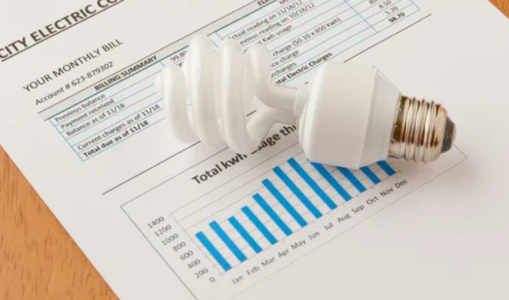Secret Revealed: Discover the simple trick this Australian family uses to live power bill-free for two years!
By
Gian T
- Replies 0
In a time when energy costs seem to be on an inexorable rise, pinching the pockets of Australians nationwide, one Adelaide family has found a way to buck the trend and live almost entirely off the energy grid. The Parsons family, from Adelaide's inner southwestern suburb of Forestville, have not only managed to avoid paying electricity bills for nearly two years but have also turned their home into a mini power station, earning money back from the grid.
The secret to their success? A combination of solar panels and a battery storage unit has turned their home into a beacon of energy efficiency. This isn't just a story about cutting costs; it's a tale of foresight, sustainability, and smart investment that could inspire many of us looking to reduce our carbon footprint and our energy bills.
Ryan and Alicia Parsons made the decision to build their dream home with energy efficiency at its core. Their previous residence proved too costly to retrofit with solar technology, so they started from scratch. Their new four-bedroom, double-storey home, completed in 2022, is equipped with a 9.1kW solar system and a battery storage unit. The total cost of this setup was $14,000, softened by a $1,000 government rebate.
Since the installation of these systems, the Parsons have not only eliminated their electricity bills but have also seen a reversal of the usual cash flow: they're making money by exporting excess power back to the grid. The family's first quarterly electricity bill was a mere $150, a stark contrast to the $1,000 they used to pay at their previous property.
The Parsons' solar and battery storage unit ensures that their home is powered throughout the year, independent of the state's electricity grid. 'Whenever the power goes off, the battery just kicks in, and everything keeps working. We do not use any power from the grid - it's pretty amazing,' Mr Parsons remarked. The sense of security that comes from not having to rely on the grid is an added benefit that Parsons hadn't fully anticipated but now greatly appreciates.
Financially, the savings are substantial. Mr Parsons estimates that they've saved around $3,000 in electricity bills and have earned additional income through feed-in tariffs—a payment made to households for the excess electricity they generate from renewable sources and export to the grid. In one instance, the family made $80 in less than an hour by exporting electricity.
The pay-off period for their battery is estimated at seven years, which is quicker than many might expect, and that doesn't even factor in the money they're earning from it. The home's energy efficiency has significantly alleviated the family's cost of living pressures. 'We're saving two grand a year,' Mr Parsons said, acknowledging that while it doesn't cover their loan repayments, the savings are significant in making things more affordable.
Mr Parsons is an advocate for others to explore the potential of solar power and battery storage units, whether for existing homes or new builds. He acknowledges the initial cost can be a barrier but suggests looking into 'green loans' that are designed to finance environmentally friendly home improvements.
Despite the fact that 3.2 million Australian households have rooftop solar, only two per cent have taken the next step to include a battery storage unit. South Australia is leading the charge, with 44 per cent of homes using solar, but still, fewer than one in 40 has a battery unit.
David Sedighi, the CEO of VoltX Energy, echoes the sentiment that demand for battery storage is expected to increase as more Australians realise the full potential of their solar systems. 'Battery storage will be the next frontier,' he says, emphasizing its essential role in Australia's transition to renewable energy.
The Parsons family's story is more than just a case study in reducing energy bills; it's a glimpse into a future where households can be self-sufficient, resilient, and environmentally responsible. It's a future where we're not just consumers of energy but producers as well, contributing to a sustainable grid and a healthier planet.
 So, dear readers, have you considered making the switch to solar and adding a battery storage unit to your home? What's holding you back, and what could encourage you to leap? Share your thoughts and experiences in the comments below – let's spark a conversation about renewable energy and how we can all play a part in Australia's energy future.
So, dear readers, have you considered making the switch to solar and adding a battery storage unit to your home? What's holding you back, and what could encourage you to leap? Share your thoughts and experiences in the comments below – let's spark a conversation about renewable energy and how we can all play a part in Australia's energy future.
The secret to their success? A combination of solar panels and a battery storage unit has turned their home into a beacon of energy efficiency. This isn't just a story about cutting costs; it's a tale of foresight, sustainability, and smart investment that could inspire many of us looking to reduce our carbon footprint and our energy bills.
Ryan and Alicia Parsons made the decision to build their dream home with energy efficiency at its core. Their previous residence proved too costly to retrofit with solar technology, so they started from scratch. Their new four-bedroom, double-storey home, completed in 2022, is equipped with a 9.1kW solar system and a battery storage unit. The total cost of this setup was $14,000, softened by a $1,000 government rebate.
Since the installation of these systems, the Parsons have not only eliminated their electricity bills but have also seen a reversal of the usual cash flow: they're making money by exporting excess power back to the grid. The family's first quarterly electricity bill was a mere $150, a stark contrast to the $1,000 they used to pay at their previous property.
The Parsons' solar and battery storage unit ensures that their home is powered throughout the year, independent of the state's electricity grid. 'Whenever the power goes off, the battery just kicks in, and everything keeps working. We do not use any power from the grid - it's pretty amazing,' Mr Parsons remarked. The sense of security that comes from not having to rely on the grid is an added benefit that Parsons hadn't fully anticipated but now greatly appreciates.
Financially, the savings are substantial. Mr Parsons estimates that they've saved around $3,000 in electricity bills and have earned additional income through feed-in tariffs—a payment made to households for the excess electricity they generate from renewable sources and export to the grid. In one instance, the family made $80 in less than an hour by exporting electricity.
The pay-off period for their battery is estimated at seven years, which is quicker than many might expect, and that doesn't even factor in the money they're earning from it. The home's energy efficiency has significantly alleviated the family's cost of living pressures. 'We're saving two grand a year,' Mr Parsons said, acknowledging that while it doesn't cover their loan repayments, the savings are significant in making things more affordable.
Mr Parsons is an advocate for others to explore the potential of solar power and battery storage units, whether for existing homes or new builds. He acknowledges the initial cost can be a barrier but suggests looking into 'green loans' that are designed to finance environmentally friendly home improvements.
Despite the fact that 3.2 million Australian households have rooftop solar, only two per cent have taken the next step to include a battery storage unit. South Australia is leading the charge, with 44 per cent of homes using solar, but still, fewer than one in 40 has a battery unit.
David Sedighi, the CEO of VoltX Energy, echoes the sentiment that demand for battery storage is expected to increase as more Australians realise the full potential of their solar systems. 'Battery storage will be the next frontier,' he says, emphasizing its essential role in Australia's transition to renewable energy.
The Parsons family's story is more than just a case study in reducing energy bills; it's a glimpse into a future where households can be self-sufficient, resilient, and environmentally responsible. It's a future where we're not just consumers of energy but producers as well, contributing to a sustainable grid and a healthier planet.
Key Takeaways
- An Adelaide family has built an energy-efficient home and avoided paying electricity bills for almost two years, thanks to their solar and battery storage system.
- Their new home, completed in 2022, includes a 9.1kW solar system and a battery storage unit, which cost $14,000 after a $1,000 government rebate.
- The Parsons family has not only saved on electricity bills but has also earned money by exporting excess solar-generated power back to the grid.
- Solar and battery storage use is on the rise in Australia, with South Australia leading the way, though battery uptake is still relatively low across the country.








